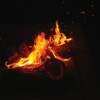Liturgies and daily prayers have long been part of Christian practice. The Psalms and the Lord’s Prayer are two prominent examples from the Bible, but church history also tells of the development of prayer books, books of hours, and the Book of Common Prayer. These aids helped the faithful meditate on scripture and Christian principles and to make prayer part of their daily rhythms. Prayer books contained liturgies for set hours in the day as well as for seasons, holidays, and life events, including births, deaths, and marriages.
Prayer books can be an enriching way for believers to connect to the wider Christian past and recognize the potential for faith connections in life’s daily experiences. The three-volume Every Moment Holy series from Rabbit Room Press provides this connection for a more modern, non-denominational audience. These prayer books echo older liturgical works by including prayers for set hours of the day and days of the week, along with prayers for repetitive work or tasks that fill daily life, such as “For the Changing of Diapers I,” (and II), and “For the Ritual of Morning Coffee.” Yet they also update the topics worthy of prayerful redemption, for example with the liturgies “Before Consuming Media” and “For Those Experiencing Road Rage.” Some prayers are to be read responsively in a group while others are for memorization and contemplation in a passing moment, as “Upon Observing a Tree Swaying in the Wind.”
It does not take many days of using Every Moment Holy or another prayer book before more moments spring to mind as worthy of liturgies: “Upon Waiting for a Computer to Turn On,” “For Grading a Towering Pile of Essays,” etc. While non-denominational faith practices have long touted the authenticity of spontaneous prayer, liturgies can be beneficial tools to turn our hearts from self-focused interpretations of events and moments and toward the qualities of the Spirit that we long for: gratitude, patience, hope, and kindness. Liturgies also point us to scripture through incorporating portions of Bible verses. Many liturgies also include a reading or contemplation of scripture as part of the practice.
I was reminded of how liturgies can turn our hearts towards God in the everyday moments of life when I found myself grading midterms in which students were lax about properly citing sources. This quotidian frustration was compounded because I had spent the earlier hours that same day mining a monograph’s sources and feeling grateful to the author for her meticulous care that made my own work more possible. I wished my students could see the value in doing that careful, albeit tedious work and how it is valuable even when it does not seem to matter on an individual assignment. The practice of taking proper care and being fastidious is worth cultivating if only because we learn to slow down and recognize the profundity of the present moment, no matter how routine or dull it may seem.
Liturgies that bring us to prayer in ordinary activities prevent us from giving in to the temptation to distinguish between “holy” and “unholy” moments. Taking time to be diligent and complete mundane work—whether changing diapers, doing dishes, or writing citations—trains our souls to pause in routine moments and not press for their passing so that we can get to “real” work or “real” faith. Just as the real work of writing is in the details, real faith is developed in the daily attitudes that shape us into becoming more—or less—like Christ.
The writing of citations, therefore, seemed to be a fitting liturgy topic. Even with the assistance of the internet and artificial intelligence, the careful work of checking citations for accuracy, determining what information to cite, and fiddling with the formatting must still be done. That time can be spent in annoyance, or it can be redeemed as a pause in the writing process, a moment to express gratitude for the work of other scholars and recognition of one’s own humble place in that greater work.
A Liturgy for the Writing of Citations
O Lord, you have placed me
in a community of scholars,
working together to explore your world.As I place commas, periods, and parentheses
Let me see that care and attentiveness
Are attributes of your creativity and grace.As I take pains to attribute my work aright
Help me be grateful for the labor of others
And see the joy of communal discovery.You are King of Details, O God.
You send planets swirling in a dangerous dance
Just as you choreograph the cells in my own body.You have given me this small task to do.
Clear my heart of frustration and boredom.For annoyance, bring gratitude
For impatience, bring absorbing careHelp me to neither take for granted the work of others
Nor the work of your Son
Nor the work you give me to do in your world.Amen























Thank you Elizabeth. As someone pretty much immersed in liturgical life, this work gave me the words I needed to continue grading this morning.
I love the liturgy–thanks for sharing this!
Our whole department (Center for Excellence in World Arts at DIU) is loving this! Posted on the walls, with an extra copy in the PhD student office–it is a wonderful reminder of so many spiritual truths that we as scholars must remember.
Thank you for contributing to shalom in our group of scholars.